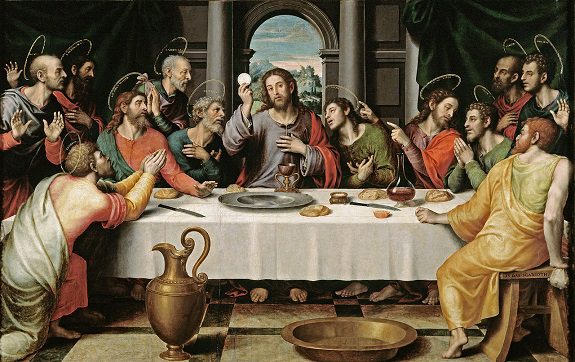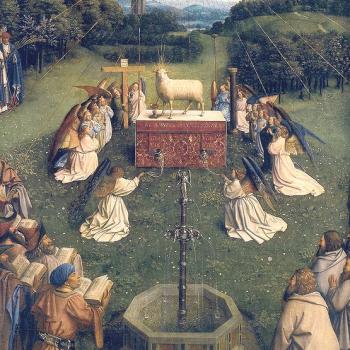. . . (Analogical Cross-Referencing and Insufficient Counter-Arguments)
The Last Supper (c. 1562), by Joan de Joanes (1510-1579) [public domain / Wikimedia Commons]
(8-15-09)
* * *
John 6:47-66 (RSV) “Truly, truly, I say to you, he who believes has eternal life. [48] I am the bread of life. [49] Your fathers ate the manna in the wilderness, and they died. [50] This is the bread which comes down from heaven, that a man may eat of it and not die. [51] I am the living bread which came down from heaven; if any one eats of this bread, he will live for ever; and the bread which I shall give for the life of the world is my flesh.” [52] The Jews then disputed among themselves, saying, “How can this man give us his flesh to eat?” [53] So Jesus said to them, “Truly, truly, I say to you, unless you eat the flesh of the Son of man and drink his blood, you have no life in you; [54] he who eats my flesh and drinks my blood has eternal life, and I will raise him up at the last day. [55] For my flesh is food indeed, and my blood is drink indeed. [56] He who eats my flesh and drinks my blood abides in me, and I in him. [57] As the living Father sent me, and I live because of the Father, so he who eats me will live because of me. [58] This is the bread which came down from heaven, not such as the fathers ate and died; he who eats this bread will live for ever.” [59] This he said in the synagogue, as he taught at Caper’na-um. [60] Many of his disciples, when they heard it, said, “This is a hard saying; who can listen to it?” [61] But Jesus, knowing in himself that his disciples murmured at it, said to them, “Do you take offense at this? [62] Then what if you were to see the Son of man ascending where he was before? [63] It is the spirit that gives life, the flesh is of no avail; the words that I have spoken to you are spirit and life. [64] But there are some of you that do not believe.” For Jesus knew from the first who those were that did not believe, and who it was that would betray him. [65] And he said, “This is why I told you that no one can come to me unless it is granted him by the Father.”[66] After this many of his disciples drew back and no longer went about with him.
One Protestant argument against the literal interpretation of John 6 is to claim that Jesus’ contrast of “flesh” and “spirit” in 6:63 establishes the symbolic and metaphorical nature of the whole discourse. But when the words “flesh” and “spirit” are opposed to each other in the New Testament, it is always a figurative use, in the sense of sinful human nature (“flesh”) contrasted with humanity enriched by God’s grace (“spirit”):
Matthew 26:41 Watch and pray that you may not enter into temptation; the spirit indeed is willing, but the flesh is weak.”Romans 7:5-6, 25 While we were living in the flesh, our sinful passions, aroused by the law, were at work in our members to bear fruit for death. [6] But now we are discharged from the law, dead to that which held us captive, so that we serve not under the old written code but in the new life of the Spirit. . . . [25] Thanks be to God through Jesus Christ our Lord! So then, I of myself serve the law of God with my mind, but with my flesh I serve the law of sin.
Romans 8:1-14 There is therefore now no condemnation for those who are in Christ Jesus. [2] For the law of the Spirit of life in Christ Jesus has set me free from the law of sin and death. [3] For God has done what the law, weakened by the flesh, could not do: sending his own Son in the likeness of sinful flesh and for sin, he condemned sin in the flesh, [4] in order that the just requirement of the law might be fulfilled in us, who walk not according to the flesh but according to the Spirit. [5] For those who live according to the flesh set their minds on the things of the flesh, but those who live according to the Spirit set their minds on the things of the Spirit. [6] To set the mind on the flesh is death, but to set the mind on the Spirit is life and peace. [7] For the mind that is set on the flesh is hostile to God; it does not submit to God’s law, indeed it cannot; [8] and those who are in the flesh cannot please God. [9] But you are not in the flesh, you are in the Spirit, if in fact the Spirit of God dwells in you. Any one who does not have the Spirit of Christ does not belong to him. [10] But if Christ is in you, although your bodies are dead because of sin, your spirits are alive because of righteousness. [11] If the Spirit of him who raised Jesus from the dead dwells in you, he who raised Christ Jesus from the dead will give life to your mortal bodies also through his Spirit which dwells in you. [12] So then, brethren, we are debtors, not to the flesh, to live according to the flesh — [13] for if you live according to the flesh you will die, but if by the Spirit you put to death the deeds of the body you will live. [14] For all who are led by the Spirit of God are sons of God.
1 Corinthians 5:5 you are to deliver this man to Satan for the destruction of the flesh, that his spirit may be saved in the day of the Lord Jesus.2 Corinthians 7:1 Since we have these promises, beloved, let us cleanse ourselves from every defilement of body and spirit, and make holiness perfect in the fear of God.
Galatians 3:3 Are you so foolish? Having begun with the Spirit, are you now ending with the flesh?
Galatians 4:29 But as at that time he who was born according to the flesh persecuted him who was born according to the Spirit, so it is now.Galatians 5:13-26 For you were called to freedom, brethren; only do not use your freedom as an opportunity for the flesh, but through love be servants of one another. [14] For the whole law is fulfilled in one word, “You shall love your neighbor as yourself.” [15] But if you bite and devour one another take heed that you are not consumed by one another. [16] But I say, walk by the Spirit, and do not gratify the desires of the flesh. [17] For the desires of the flesh are against the Spirit, and the desires of the Spirit are against the flesh; for these are opposed to each other, to prevent you from doing what you would. [18] But if you are led by the Spirit you are not under the law. [19] Now the works of the flesh are plain: fornication, impurity, licentiousness, [20] idolatry, sorcery, enmity, strife, jealousy, anger, selfishness, dissension, party spirit, [21] envy, drunkenness, carousing, and the like. I warn you, as I warned you before, that those who do such things shall not inherit the kingdom of God. [22] But the fruit of the Spirit is love, joy, peace, patience, kindness, goodness, faithfulness, [23] gentleness, self-control; against such there is no law. [24] And those who belong to Christ Jesus have crucified the flesh with its passions and desires. [25] If we live by the Spirit, let us also walk by the Spirit. [26] Let us have no self-conceit, no provoking of one another, no envy of one another.1 Peter 3:18 For Christ also died for sins once for all, the righteous for the unrighteous, that he might bring us to God, being put to death in the flesh but made alive in the spirit;1 Peter 4:6 For this is why the gospel was preached even to the dead, that though judged in the flesh like men, they might live in the spirit like God.
In other words, Jesus is saying that His words can only be received by men endowed with supernatural grace.
Matthew 13:13, 19 This is why I speak to them in parables, because seeing they do not see, and hearing they do not hear, nor do they understand. . . . [19] When any one hears the word of the kingdom and does not understand it, the evil one comes and snatches away what is sown in his heart; this is what was sown along the path.Luke 5:21-22 And the scribes and the Pharisees began to question, saying, “Who is this that speaks blasphemies? Who can forgive sins but God only?” [22] When Jesus perceived their questionings, he answered them, “Why do you question in your hearts?John 8:27, 43-47 They did not understand that he spoke to them of the Father. . . . [43] Why do you not understand what I say? It is because you cannot bear to hear my word. [44] You are of your father the devil, and your will is to do your father’s desires. He was a murderer from the beginning, and has nothing to do with the truth, because there is no truth in him. When he lies, he speaks according to his own nature, for he is a liar and the father of lies. [45] But, because I tell the truth, you do not believe me. [46] Which of you convicts me of sin? If I tell the truth, why do you not believe me? [47] He who is of God hears the words of God; the reason why you do not hear them is that you are not of God.”John 12:37-40 Though he had done so many signs before them, yet they did not believe in him; [38] it was that the word spoken by the prophet Isaiah might be fulfilled: “Lord, who has believed our report, and to whom has the arm of the Lord been revealed?” [39] Therefore they could not believe. For Isaiah again said, [40] “He has blinded their eyes and hardened their heart, lest they should see with their eyes and perceive with their heart, and turn for me to heal them.”
Moreover, in many other places in Scripture, Jesus explains His meaning when someone merely is uncomprehending (as opposed to willfully disbelieving). A typical example of this occurs in John 3:1-15: the incident with Nicodemus regarding the meaning of “born again”. Nicodemus asks: “How can a man be born when he is old? Can he enter a second time into his mother’s womb and be born?” (3:4). Jesus explains His meaning (3:5-8). Nicodemus, still baffled, again asks: “How can this be?” (3:9). Jesus replied: “Are you a teacher of Israel, and yet you do not understand this?” (3:10) and then proceeds to explain some more (3:11-15). He explained because He knew that Nicodemus was truly seeking. When someone wasn’t seeking or open in their spirit, He usually (if not always) would not do so, as in John 6. Here are further examples:
Matthew 13:36, 51 And his disciples came to him, saying, “Explain to us the parable of the weeds of the field.” . . . [51] “Have you understood all this?” They said to him, “Yes.”
Matthew 15:10-20 And he called the people to him and said to them, “Hear and understand: [11] not what goes into the mouth defiles a man, but what comes out of the mouth, this defiles a man.” [12] Then the disciples came and said to him, “Do you know that the Pharisees were offended when they heard this saying?” [13] He answered, “Every plant which my heavenly Father has not planted will be rooted up. [14] Let them alone; they are blind guides. And if a blind man leads a blind man, both will fall into a pit.” [15] But Peter said to him, “Explain the parable to us.” [16] And he said, “Are you also still without understanding? [17] Do you not see that whatever goes into the mouth passes into the stomach, and so passes on? [18] But what comes out of the mouth proceeds from the heart, and this defiles a man. [19] For out of the heart come evil thoughts, murder, adultery, fornication, theft, false witness, slander. [20] These are what defile a man; but to eat with unwashed hands does not defile a man.” (cf. Mk 7:17-18)
Matthew 16:5-12 When the disciples reached the other side, they had forgotten to bring any bread. [6] Jesus said to them, “Take heed and beware of the leaven of the Pharisees and Sad’ducees.” [7] And they discussed it among themselves, saying, “We brought no bread.” [8] But Jesus, aware of this, said, “O men of little faith, why do you discuss among yourselves the fact that you have no bread? [9] Do you not yet perceive? Do you not remember the five loaves of the five thousand, and how many baskets you gathered? [10] Or the seven loaves of the four thousand, and how many baskets you gathered? [11] How is it that you fail to perceive that I did not speak about bread? Beware of the leaven of the Pharisees and Sad’ducees.” [12] Then they understood that he did not tell them to beware of the leaven of bread, but of the teaching of the Pharisees and Sad’ducees.
Matthew 17:9-13 And as they were coming down the mountain, Jesus commanded them, “Tell no one the vision, until the Son of man is raised from the dead.” [10] And the disciples asked him, “Then why do the scribes say that first Eli’jah must come?” [11] He replied, “Eli’jah does come, and he is to restore all things; [12] but I tell you that Eli’jah has already come, and they did not know him, but did to him whatever they pleased. So also the Son of man will suffer at their hands.” [13] Then the disciples understood that he was speaking to them of John the Baptist.
Matthew 19:24-26 “Again I tell you, it is easier for a camel to go through the eye of a needle than for a rich man to enter the kingdom of God.” [25] When the disciples heard this they were greatly astonished, saying, “Who then can be saved?” [26] But Jesus looked at them and said to them, “With men this is impossible, but with God all things are possible.”
Mark 4:33-34 With many such parables he spoke the word to them, as they were able to hear it; [34] he did not speak to them without a parable, but privately to his own disciples he explained everything.
Therefore, He would have in John 6 if a misunderstanding were involved, rather than a hardhearted disbelief, brought on by the influence of Satan.
Luke 8:9-11 And when his disciples asked him what this parable meant, [10] he said, “To you it has been given to know the secrets of the kingdom of God; but for others they are in parables, so that seeing they may not see, and hearing they may not understand. [11] Now the parable is this: The seed is the word of God.”
Jesus continued explaining in 8:12-15.
Luke 9:46-48 And an argument arose among them as to which of them was the greatest. [47] But when Jesus perceived the thought of their hearts, he took a child and put him by his side, [48] and said to them, “Whoever receives this child in my name receives me, and whoever receives me receives him who sent me; for he who is least among you all is the one who is great.”
Luke 24:13-27 That very day two of them were going to a village named Emma’us, about seven miles from Jerusalem, [14] and talking with each other about all these things that had happened. [15] While they were talking and discussing together, Jesus himself drew near and went with them. [16] But their eyes were kept from recognizing him. [17] And he said to them, “What is this conversation which you are holding with each other as you walk?” And they stood still, looking sad. [18] Then one of them, named Cle’opas, answered him, “Are you the only visitor to Jerusalem who does not know the things that have happened there in these days?” [19] And he said to them, “What things?” And they said to him, “Concerning Jesus of Nazareth, who was a prophet mighty in deed and word before God and all the people, [20] and how our chief priests and rulers delivered him up to be condemned to death, and crucified him. [21] But we had hoped that he was the one to redeem Israel. Yes, and besides all this, it is now the third day since this happened. [22] Moreover, some women of our company amazed us. They were at the tomb early in the morning [23] and did not find his body; and they came back saying that they had even seen a vision of angels, who said that he was alive. [24] Some of those who were with us went to the tomb, and found it just as the women had said; but him they did not see.” [25] And he said to them, “O foolish men, and slow of heart to believe all that the prophets have spoken! [26] Was it not necessary that the Christ should suffer these things and enter into his glory?” [27] And beginning with Moses and all the prophets, he interpreted to them in all the scriptures the things concerning himself.
John 4:31-34 Meanwhile the disciples besought him, saying, “Rabbi, eat.” [32] But he said to them, “I have food to eat of which you do not know.” [33] So the disciples said to one another, “Has any one brought him food?” [34] Jesus said to them, “My food is to do the will of him who sent me, and to accomplish his work.”
John 8:21-32 Again he said to them, “I go away, and you will seek me and die in your sin; where I am going, you cannot come.” [22] Then said the Jews, “Will he kill himself, since he says, ‘Where I am going, you cannot come’?” [23] He said to them, “You are from below, I am from above; you are of this world, I am not of this world. [24] I told you that you would die in your sins, for you will die in your sins unless you believe that I am he.” [25] They said to him, “Who are you?” Jesus said to them, “Even what I have told you from the beginning. [26] I have much to say about you and much to judge; but he who sent me is true, and I declare to the world what I have heard from him.” [27] They did not understand that he spoke to them of the Father. [28] So Jesus said, “When you have lifted up the Son of man, then you will know that I am he, and that I do nothing on my own authority but speak thus as the Father taught me. [29] And he who sent me is with me; he has not left me alone, for I always do what is pleasing to him.” [30] As he spoke thus, many believed in him. [31] Jesus then said to the Jews who had believed in him, “If you continue in my word, you are truly my disciples, [32] and you will know the truth, and the truth will make you free.”
In this instance, Jesus explained because He knew (in His omniscience) that some of the hearers would believe in Him, while others would not.
John 10:6-7 This figure Jesus used with them, but they did not understand what he was saying to them. [7] So Jesus again said to them, “Truly, truly, I say to you, I am the door of the sheep.”
Jesus elaborated that He was the “door”: key information that was not present in 10:1-5.
John 11:8-15 The disciples said to him, “Rabbi, the Jews were but now seeking to stone you, and are you going there again?” [9] Jesus answered, “Are there not twelve hours in the day? If any one walks in the day, he does not stumble, because he sees the light of this world. [10] But if any one walks in the night, he stumbles, because the light is not in him.” [11] Thus he spoke, and then he said to them, “Our friend Laz’arus has fallen asleep, but I go to awake him out of sleep.” [12] The disciples said to him, “Lord, if he has fallen asleep, he will recover.” [13] Now Jesus had spoken of his death, but they thought that he meant taking rest in sleep. [14] Then Jesus told them plainly, “Laz’arus is dead; [15] and for your sake I am glad that I was not there, so that you may believe. But let us go to him.”
John 16:17-19, 29-31 Some of his disciples said to one another, “What is this that he says to us, ‘A little while, and you will not see me, and again a little while, and you will see me’; and, ‘because I go to the Father’?” [18] They said, “What does he mean by ‘a little while’? We do not know what he means.” [19] Jesus knew that they wanted to ask him; so he said to them, “Is this what you are asking yourselves, what I meant by saying, ‘A little while, and you will not see me, and again a little while, and you will see me? . . .” . . . [29] His disciples said, “Ah, now you are speaking plainly, not in any figure! [30] Now we know that you know all things, and need none to question you; by this we believe that you came from God.” [31] Jesus answered them, “Do you now believe?”













